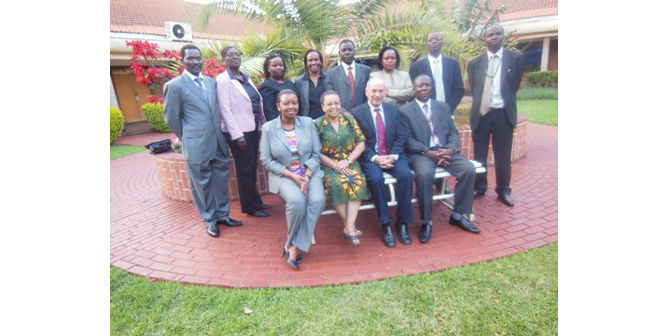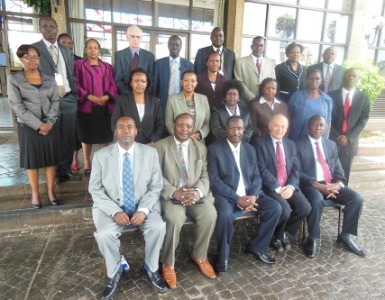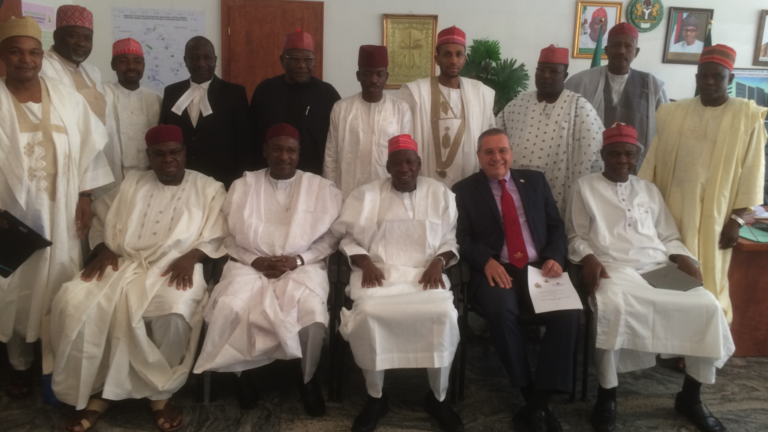When managers of the Central Bank of Kenya sought a partner through the World Bank to do an eight-month analysis and training program, they naturally turned to Israel’s Galilee International Management Institute (GIMI) in northern Nahalal.
GIMI president Joseph (Yossie) Shevel, an expert in economic development, explains that many Kenyan managers are graduates of GIMI’s twice-yearly program in international banking management. So the World Bank’s awarding of the tender to GIMI for training students in the Kenya School of Monetary Studies brought old friends back together.
Spread the Word
• Email this article to friends or colleagues
• Share this article on Facebook or Twitter
• Write about and link to this article on your blog
• Local relevancy? Send this article to your local press
But the camaraderie revolved around a project of serious proportions, bringing the Kenyans to Israel and the Israelis to Kenya several times each.
“There is a financial crisis in the world, and we wanted to see how it affects East African countries in general and Kenya in particular, and what to do to minimize the damage,” Shevel tells ISRAEL21c. “Our goal was to determine how to upgrade the function of the Central Bank of Kenya.”
Over the course of the eight months, ending in late September, GIMI helped formulate policies relating to pensions, training and human resources management in the Central Bank and commercial banks.
“We went through every department there and analyzed needs,” says Shevel. The team also met with a variety of stakeholders, such as the Kenya Power & Lighting company, in order to better evaluate the courses offered at the Kenya School of Monetary Studies.
The Kenyans visited Israeli banks, and told Shevel they want to implement some of what they saw into their own banking and management methods.
The two parties finished by signing a memorandum of understanding for GIMI to continue capacity-building and analysis of training needs at the Central Bank for the next three years. GIMI faculty also will train employees in the central banks of Tanzania, Uganda, Burundi and Rwanda (and later, South Sudan), beginning in January 2013.
Averting chaos
The challenges facing these East African countries are inflation, soaring interest rates and difficulty attracting investors, Shevel explains. Wise policies are sorely needed to boost the economies and get more people into the workforce.
“The bank’s policies are the most influential factor when it comes to unemployment, Africa’s biggest problem,” Shevel relates.
While economic growth in all the five countries has been slowly rising in the last five or six years despite the financial crisis, he says, “everybody is very concerned that in the year 2050 the population in Kenya will be 100 million and if they don’t plan well now, there will be chaos.”
In a separate project, GIMI officials went to Nigeria’s Central Bank recently to help its management identify areas in which GIMI will devise special training programs for the bank’s 6,000 employees.
GIMI is well acquainted with the needs in Nigeria thanks to 20 years of training various sectors in the country. Most recently, the institute taught basic farm management and business skills to groups of ex-militants from Nigeria in order to help them leverage Israeli farming and agricultural expertise for a brighter future. The training included hands-on experience and classroom time.
Among the group of Israeli college professors and professionals involved in the World Bank project were GIMI DeanNathan Tirosh; International Cooperation Division Coordinator Janine Ross; Amos Baranes, a certified public accountant with a doctorate in economics from the University of Chicago; Yossi Zelnik, a former Israeli banking executive and now academic director of GIMI’s banking management program; and Haim Taub, a specialist in human resources management and designing training programs in capacity-building.


















